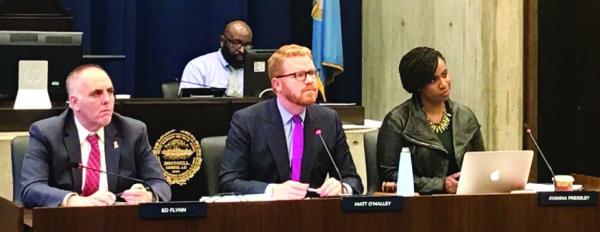October 31, 2018

City councillor Ed Flynn, Councillor Matt O’Malley and Councillor Ayanna Pressley led a hearing on gas leaks and the labor lockout on Tuesday.
Locked out National Grid workers, members of local steelworkers unions, and representatives from environmental interest groups were all in attendance in the Boston city council chambers on Wednesday for a lengthy hearing on the safety of Boston’s gas infrastructure and the city’s preparedness for any emergency response. City councillor Matt O’Malley, along with councillors Ayanna Pressley and Ed Flynn convened the hearing in the wake of a series of explosions and fires in Merrimack Valley in September. The trio questioned three panels that included city officials, labor union leaders, and environmental experts.
But much of the hearing was highlighted by the absence of a notable player in the crisis: National Grid. Councillor O’Malley began the hearing by reading a letter from the gas corporation explaining they had declined his invitation to the hearing, before expressing his own frustration with their decision.
“It is disappointing but unsurprising that National Grid has declined to attend today,” he said, labelling the company’s actions as “obstructionist.” Other city councillors echoed O’Malley’s sentiment, with Councillor Flynn calling the letter “disrespectful” and several councillors suggesting the possible use of a subpoena to ensure National Grid’s presence at future hearings.
Since locking out their workers in June over negotiation disputes, National Grid has drawn the ire of employees, residents, and elected officials alike by depriving workers health benefits and insurance, and replacing 1,250 locked out workers with a crew of private contractors, who labor union representatives claim are inexperienced and unqualified to do the work.
Now, with cold weather beginning to arrive in the region, O’Malley expressed concerns that the lockout has exacerbated what he called a “slow burning crisis” in Boston’s aging natural gas infrastructure, the second oldest in the country behind Baltimore.
Numbers from a recent National Grid report support that theory: since June, replacement of faulty gas mains is down by 80 percent, and leak repairs are down by over 50 percent.
John Buonopane, President of Steelworkers Local 12012, said that National Grid’s decision to hire unqualified contractors is putting people in danger, and pointed to a recent near-disaster in Woburn, in which a fill-in engineer was working on an over-pressurized line, as an example.
“I firmly believe that the over-pressurization in Woburn would not have occurred if our people were on the job,” said Buonopane. Repairing gas lines is dangerous work that requires skilled workers with on the job training, he argued. “We know the gas systems, we have institutional knowledge, we know the history,” he said.
Most issues with gas infrastructure fall under the jurisdiction of the Department of Public Utilities, a state entity that also declined an invitation to attend the hearing. According to Joe Kirylo, President of Steelworkers Local 12003, the DPU has failed to adequately regulate National Grid’s response to the gas crisis, ignoring countless safety violations submitted by labor unions.
“Let’s face it: the DPU is in National Grid’s pocket,” said Rich Rogers of the Greater Boston Labor Council.
Buonopane juxtaposed National Grid’s $4 billion profit margin last year with its treatment of one of his workers, a double-amputee, 40-year veteran of the union whose insurance was cut by the company following the lockout.
“It’s disgusting,” he asserted. “Most of the people who make the decisions at National Grid are based in the UK. They’re detached and indifferent.”
As far as union leaders are concerned, the company’s irresponsible decision-making could lead to Boston-area disaster similar to the one in the Merrimack Valley. At one point, Kirylo reiterated what he said in a recent state house news report:
“I hate to say this but the way it’s going, it’s not a matter of if another house is going to explode,” he said. “It’s when.”


